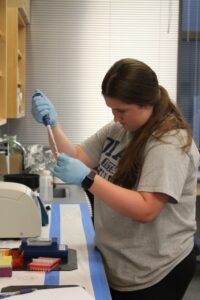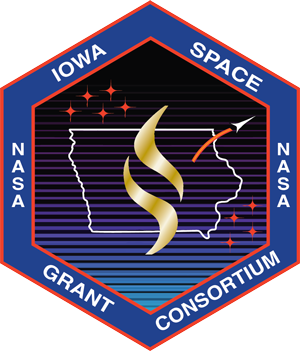 A big concern for the health of astronauts and space crews is exposure to radiation and NASA lists “Risk of Radiation Carcinogenesis from Space Radiation” as one of its top research priorities. On Earth, we are protected from most space radiation by the atmosphere, but radiation increasingly affects those outside of Earth’s atmosphere and beyond low Earth orbit. Ionizing radiation damages DNA most commonly via phosphodiester backbone breakage. Humans can repair these damages, but prolonged exposure can lead to genomic instability and cancer. Thus, it is important to understand and monitor genome stability of astronauts during space travel. Therefore, our main goal is to develop biomarkers of radiation-induced DNA damage for monitoring genome stability of astronauts during and after space travel, thus contributing to safer space exploration. Previously, we have analyzed signal transduction DNA damage repair pathway genes in human mammary tumor cell lines. However, skin cancer is also a major concern due to radiation exposure, and understanding DNA repair pathways in skin cancer is equally important. Therefore, using the human skin cancer cell line HTB-72 and doxorubicin as a radiomimetic model, we will investigate how the oncoprotein BRAF responds to radiation-induced DNA damage. The data produced from this project will help us understand differences between the development of breast cancer and skin cancer.
A big concern for the health of astronauts and space crews is exposure to radiation and NASA lists “Risk of Radiation Carcinogenesis from Space Radiation” as one of its top research priorities. On Earth, we are protected from most space radiation by the atmosphere, but radiation increasingly affects those outside of Earth’s atmosphere and beyond low Earth orbit. Ionizing radiation damages DNA most commonly via phosphodiester backbone breakage. Humans can repair these damages, but prolonged exposure can lead to genomic instability and cancer. Thus, it is important to understand and monitor genome stability of astronauts during space travel. Therefore, our main goal is to develop biomarkers of radiation-induced DNA damage for monitoring genome stability of astronauts during and after space travel, thus contributing to safer space exploration. Previously, we have analyzed signal transduction DNA damage repair pathway genes in human mammary tumor cell lines. However, skin cancer is also a major concern due to radiation exposure, and understanding DNA repair pathways in skin cancer is equally important. Therefore, using the human skin cancer cell line HTB-72 and doxorubicin as a radiomimetic model, we will investigate how the oncoprotein BRAF responds to radiation-induced DNA damage. The data produced from this project will help us understand differences between the development of breast cancer and skin cancer.
Abigail Whittemore – Drake University
Student: Abigail Whittemore, Undergraduate Student in Biochemistry and Cell and Molecular Biology (BCMB), Drake University
Research Mentor: Dr. Pramod Mahajan

Signal Transduction Studies During Repair of Radiation-Damaged DNA in Skin Cancer Cells
2022-2023, Undergraduate
